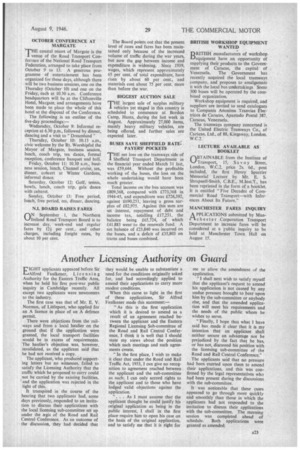Another Licensing Authority on Guard r 1GHT applicants appeared before
Page 25

If you've noticed an error in this article please click here to report it so we can fix it.
Sir 1-4Alfred Faulkener, Licensing Authority for the Eastern Traffic Area, when he held his first post-war public inquiry in Cambridge recently. All except two applicants were newcomers to the industry.
The first case was that of Mr. E. V. Norman, of Littleport, who applied for an A licence in place of an A defence permit.
There were objections from the railways and from a local haulier on the ground that if the application were granted, the local transport facilities would be in excess of requirements. The haulier's objection was, however, invalidated, as the applicant said that he had not received a copy.
The applicant, who produced supporting letters but no witnesses, failed to satisfy the Licensing Authority that the traffic which he proposed to carry could not be carried by the existing facilities, and the application was rejected in the light of this.
It transpired in the course of the hearing that two applicants had, some days previously, responded to an invitation to discuss their applications with the local licensing sub-committee set up under the eegis of the Road and Rail Central Conference. As an outcome of the discussion, they had decided that they would be unable to substantiate a need for the conditions originally asked for, and had accordingly applied to amend their applications to carry more modest conditions.
When this came to light in the first of these applications, Sir Alfred Faulkener made this statement:— " As this is the first application which it is desired to amend as a result of an agreement reached between the applicant and the Eastern Regional Licensing Sub-committee of • the Road and Rail Central Conference, I think it is well that I should state my views about the position which such meetings and such agreements create. • "In the first place, I wish to make it clear that under the Road and Rail Traffic Act, 1933, I can give no recognition to agreement reached between the applicant and the sub-committee as such; I can only accord rights to the, applicant and to those who have lodged valid objections against the application.
" . . As I must assume that the applicant thought he could justify his original application as being in the public interest, 1 shall in the first place requirehim to open his case on the basis of the original application. and to satisfy me that it is right for me to allow the amendment of the application.
" I shall next wish to satisfy myself that the applicant's request to amend his application is not caused by any undue pressure brought to bear upon him by the sub-committee or anybody else, and that the amended application will meet his requirements and the needs of the public whom he wishes to serve.
"Finally, I hope that what I have said has made it clear that it is my intention that an applicant shall neither secure an advantage nor be prejudiced by the fact that he has, or has not, discussed his position with the licensing sub-committee of the Road and Rail Central Conference." The applicants said that no pressure had been exerted upon them to amend their applications, and this was con firmed by the legal representatives who had been present during the discussions with the sub-committee.
It was noticeable that these cases appeared to go through more quickly and smoothly than those in which the applicants had not responded to the invitation to discuss their applications with the sub-committee. The morning session was completed ahead of schedule. Both applications were granted as amended.




































































